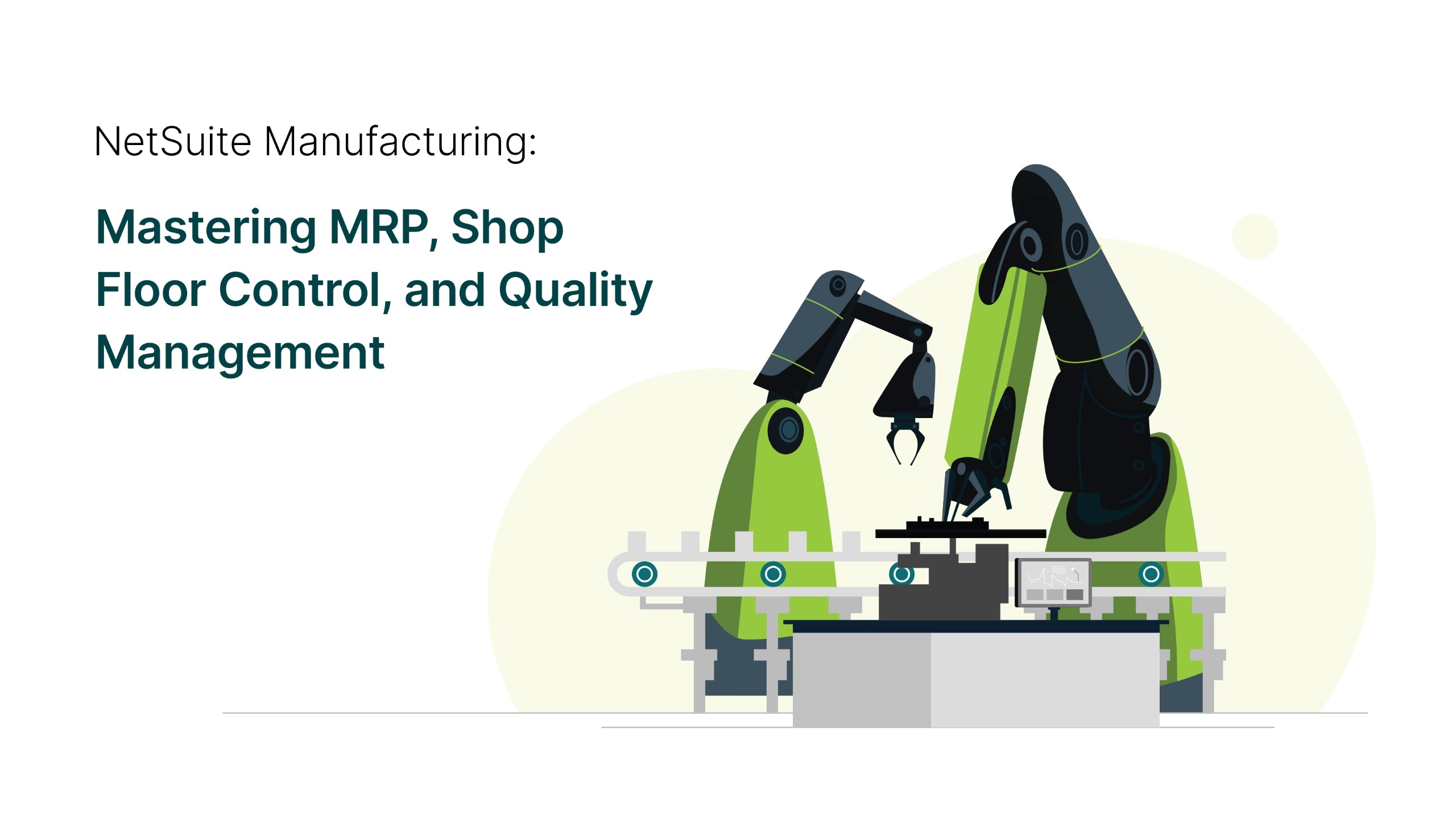NetSuite Manufacturing: Mastering MRP, Shop Floor Control, and Quality Management

Think of a manufacturing process in which all material orders are delivered on time, production goes without a hitch, and all products are of the highest quality. This is the reality that Oracle NetSuite's integrated suite provides.
Manufacturers cannot depend on disconnected systems and manual procedures in a competitive market. They require technology that ties together planning, execution, and quality control. The Material Requirements Planning (MRP) features of NetSuite, the Shop Floor Control, and the Quality Management System (QMS) all combine to transform operations by providing real-time estimates and simplifying the working process. This post examines the function of these components and how specialists like Jobin & Jismi help businesses gain maximum value from them.
NetSuite Manufacturing Module Overview
NetSuite Advanced Manufacturing
The advanced manufacturing module in NetSuite offers an end-to-end system that incorporates planning, execution, and monitoring of production into the wider NetSuite ERP. It is also integrated perfectly with financials, CRM, inventory, and order management, providing manufacturers with a view and control of their operations.
Core Components
Work Order Management:
Creates, releases, and tracks work orders and interfaces with inventory, making sure that materials, tools, and resources get where they need to be on time and alerts the manager in case of delay or shortages.
Production Planning and Scheduling:
Optimizes the production sequence with a given resource availability and order priority. Helps planners to avoid bottlenecks, meet deadlines, and allocate workload appropriately.
Manufacturing Execution System (MES):
Captures real-time data on work order processing, machine usage, and operator inputs. Supports informed adjustments and keeps planning teams aligned with the shop floor.
Shop Floor Control:
Provides visibility to labor and equipment. Workers can log job activity through mobile devices, while managers use key performance measures to improve efficiency and reduce downtime.
Advanced WIP and Routing:
Tracks work-in-progress, defines routing steps, and controls scheduling for a multi-stage production. Ensures precise costing and traceability over a complex workflow.
Quality Management System (QMS) -Add-on:
QMS can be added as a module, enabling inspection, compliance monitoring, and in-process validation. Maintains product quality and regulatory controls with automatic alerts and reporting.
Benefits of the Manufacturing Module
Integration brings together more components to deliver more streamlined workflows, real-time visibility, and limited manual intervention. Automated scheduling then leads to better allocation of resources. Managers gain insights into performance across departments. When integrated as part of NetSuite’s wider ERP, manufacturers are better able to align production with business goals and customer expectations.
What is the MRP System in NetSuite?
Understanding Material Requirements Planning (MRP)
Simply put, MRP ensures that you have the right material in the right amount at the right moment. It eliminates guesswork by evaluating the Bill of Materials (BOM), inventory levels, supplier lead times, and demand.
For example, a jewelry manufacturer can utilize MRP to determine exactly how much gold and diamonds to order based on existing sales orders, current inventory, and supplier schedules. This prevents overstocking and production delays.
NetSuite’s MRP Capabilities
Unlike legacy MRP systems, NetSuite’s MRP is embedded within a unified cloud ERP platform that consolidates procurement, production, sales, inventory, and finance. This integration ensures real-time data flow, allowing teams across departments to collaborate using a single, consistent source of truth.
NetSuite supports both Make-to-Stock (MTS) and Make-to-Order (MTO) manufacturing strategies. In a Make-to-Stock model, production is driven by demand forecasts and inventory is replenished automatically to meet anticipated sales. For example, NetSuite can trigger the automatic replenishment of frequently sold items to maintain optimal stock levels. In contrast, the Make-to-Order model initiates production only after a customer order is received. In this case, the system generates work orders directly in response to sales orders, ensuring customized production and reduced inventory holding.
The MRP engine manages multi-level Bills of Materials (BOMs), automatically generates purchase and production orders, and facilitates seamless coordination between procurement, manufacturing, and fulfillment teams.
Key MRP Features in NetSuite
NetSuite MRP offers a comprehensive set of features for precise planning and responsive execution so that manufacturers can produce as per demand, eliminate waste, and be agile.
Demand Planning and Forecasting
It utilizes past sales data and additional external factors such as seasons or promotions to predict material requirements and reduce excess and understocking.
Supply Chain Control Tower and Allocation
Provides centralized visibility across the entire supply chain, with allocation tools that match inventory to specific demand sources, allowing proactive changes.
Planning Time Fences and Horizons
Allows for long-term planning with fixed schedules in addition to flexibility in the short term to adjust to unexpected fluctuations in supply or demand.
MRP workbench (Planners' Workbench)
Lets planners perform “what-if” scenario simulations, evaluating material availability, and visualizing results before undertaking changes, decreasing risks, and enhancing the responsiveness level.
Capacity Management
Monitors the labor and equipment capacity to ensure production resources match planned workloads, and such imbalances are identified before leading to delays.
Real-Time Inventory Tracking
Tracks inventory across all locations, improves replenishment timing, warehouse capacity, and working capital utilization.
BOM Management
Allows multi-level BOMs and manages version control to keep production in line with correct up-to-date specifications.
Exception Management
Automatically flags any disruptions that might cause shortages or late deliveries and allows planners to respond easily to keep the production smooth.
Multi-Location Planning
Enables coordinated planning and collaboration across warehouses or plants, where each warehouse/plant has different inventory and sourcing policies, and still operates within the same system.
Order Management and Integrated Scheduling
Connects customer and work orders to production schedule, ensuring real-time updates and synchronized execution.
These features allow for more intelligent planning throughout the whole manufacturing process. An example would be a furniture manufacturer who simulated a surge in demand using the Planners Workbench and found that there was a shortage of wood. They made pre-adjustments in procurement and prevented production delays.
Shop Floor Control: Real-Time Production Management
What is Shop Floor Control?
Shop Floor Control connects planning systems with factory floor operations. It provides the manufacturer with tools to track labor, machines, and materials in real-time. This then enables supervisors to monitor production and make quick adjustments when priorities change or issues arise.
NetSuite Shop Floor Control Features
NetSuite's Shop Floor Control provides real-time visibility and control over production activities and allows manufacturers to manage operations right from the shop floor.
Work Order Tracking
Track order status from the release stage through to completion. Operators and managers both can monitor current progress levels; they can also identify any delays and ensure that jobs are kept to schedule.
Resource Management
Real-time monitoring of labor and machines. NetSuite records time logs from workers and equipment utilization, enabling managers to plan workloads better and reduce idle times.
Mobile Shop Floor Interface
Operators can clock in, record job progress, and report faults and problems directly from tablets or touchscreen devices on the shop floor. This digital interface makes data entry faster and more accurate.
Barcode Scanning Integration
Barcode functionality enables fast and reliable data capture for components, work orders, and finished goods. This avoids manual entries, speeds up transactions, and minimizes human errors.
Production Reporting
Real-time dashboard displays key performance indicators such as throughput, downtime, and order completion rates. These metrics help managers identify bottlenecks to make informed decisions.
Prioritization and Scheduling
Work orders can be prioritized automatically or manually based on urgency, resource availability, or business objectives. This ensures that production groups can deliver what matters most, a good throughput.
Together, the features provide manufacturers control over day-to-day operations and the agility to respond to change in demand or production conditions.
Benefits of Shop Floor Control
The production teams can avoid delays, better manage workloads, and maintain quality standards with real-time data. The mobile tools cut down the paperwork and allow the frontline personnel to make their contribution to the system updates themselves. Tracking is done automatically, which improves accuracy and response time.
NetSuite Quality Management System
Does NetSuite Have a QMS?
NetSuite has a Quality Management System, designed to work alongside production and inventory systems. However, it generally does not form part of the core manufacturing module and is licensed as an add-on.
QMS Features
QMS enables the quality manager to create inspection criteria at different stages, from incoming material inspections to in-process inspections and even tests on final products. It supports:
1. Test definitions for different configurations and types of inspections.
2. Mobile inspection tools for quick and accurate data entry.
3. Inspection plans linked to BOMs, items, or vendors.
4. Automated workflows triggered by a failed test.
5. Dashboards and reports showing compliance, vendor, and trend tracking.
Benefits
NetSuite QMS prevents costly rework, improves supplier compliance, and ensures products meet both internal and external standards. Using mobile data-capture and in-built reporting, manufacturers are able to ensure compliance, streamline audits, and long-term product consistency.
NetSuite vs Traditional MRP and QMS Tools
Traditional MRP or QMS systems typically operate as silos and require manual data transfer or an expensive integration. NetSuite's solution is integrated with its ERP so that planning, execution, quality, and financial management are maintained on a single platform.
This integration eliminates duplication, enables better decision-making, and reduces the total cost of ownership. Since everything is in the cloud, updates are applied in real-time, allowing users to access the system from anywhere. This is a significant factor for manufacturers running multiple plants or remote teams.
Role of NetSuite Partners Like Jobin & Jismi
Even though the tool is powerful in itself, success depends on how well systems are configured for that specific business. Jobin & Jismi, a trusted NetSuite Solution Provider, offers implementation, customization, integration, and support services tailored to individual needs.
The expert team at Jobin and Jismi assists organizations in developing custom workflows, dashboards, reports, and integrations to extend NetSuite's core functionalities. With domain knowledge in manufacturing, their consultants help implement MRP, Shop Floor Control, and QMS, incorporating best practices and configuring them for maximum benefit.
Today’s manufacturers need more than just software to prosper in this demanding world. They require unified intelligent systems for planning, execution, and quality implementation throughout the entire manufacturing operation. NetSuite's MRP, Shop Floor Control, and Quality Management System provide that foundation.
MRP makes materials available when they are needed. Shop Floor Control provides real-time visibility into production. The Quality Management System ensures high product quality standards while also ensuring compliance. Together, this culminates in truly integrated manufacturing solutions.
Ready to streamline your manufacturing operations with NetSuite?
Whether you want to streamline production, enhance inventory accuracy, or uphold the highest standards of quality, NetSuite unifies and streamlines all of your processes on a single platform, revolutionizing your business.
Contact Jobin & Jismi to learn how you can get a NetSuite solution customized to meet your manufacturing goals.
on LinkedIn




